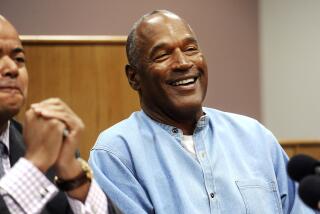Lou Saban dies at 87; NFL coach and Yankees executive
Lou Saban, who coached O.J. Simpson in the NFL and ran the New York Yankees for George Steinbrenner during a well-traveled career as a coach and administrator that spanned five decades, died Sunday. He was 87.
Saban died at his home in North Myrtle Beach, S.C., his wife, Joyce, said. He had heart problems for years and recently suffered a fall that required hospitalization, she said.
Saban played football at Indiana University and for the Cleveland Browns of the NFL before embarking on a remarkable head coaching career that included stops with the Boston Patriots and the Buffalo Bills of the old American Football League and the NFL’s Denver Broncos, along with college jobs at Miami, Army, Northwestern and Maryland.
Saban, who as a coach was 95-99-7 in 16 seasons of pro football, also was president of the New York Yankees in 1981 and 1982 and coached high school football from 1987 to 1989.
“He has been my friend and mentor for over 50 years and one of the people who helped shape my life,” Yankees owner George Steinbrenner said in a statement. “Lou was tough and disciplined, and he earned all the respect and recognition that came his way. He spent a lifetime leading, teaching and inspiring, and took great satisfaction in making the lives around him better. This is a tremendous loss to me personally.”
Saban shared the last name of another prominent football coach, Alabama’s Nick Saban. Joyce Saban said the two men might have been second cousins but the families weren’t sure if they were related.
Louis Henry Saban was born in Brookfield, Ill., on Oct. 13, 1921, and was a 1940 graduate of Lyons Township High School. After starring at Indiana, Saban played for the Browns from 1946 to 1949 and the next year accepted his first head-coaching position -- at the former Case Institute of Technology in Cleveland.
In 1955, he took over at Northwestern for a year, then moved to Western Illinois until entering the pro ranks in 1960 to coach the Patriots of the newly formed AFL.
From there, Saban went to the Bills in 1962 and guided them to AFL championships in 1964 and 1965, the only championships the Bills have ever won. After a stint with the Broncos, Saban returned to Buffalo. During his second stint with the Bills from 1972 to 1976, he oversaw O.J. Simpson’s record-breaking, 2,003-yard rushing season in 1973.
After quitting the Bills in midseason of 1976, Saban spent two years at the University of Miami, where he recruited future Buffalo quarterback Jim Kelly.
Saban became known for quickly changing jobs. He coached Army in 1979 and spent 19 days as athletic director at the University of Cincinnati. He went on to coach at high schools, colleges and in the Arena Football League.
Saban spent the 1990s starting or rebuilding programs at schools including Nebraska’s Peru State and New York’s Canton Tech and Alfred State, where he left before the team played its first game. He coached Central Florida in 1983 and 1984.
“I’ve coached at all levels, covered the gamut, and I’ve never really seen any difference,” Saban said after being hired to coach Alfred in ’94. “My coaching techniques are pretty much the same, with some adjustments for what younger players can and can’t do.”
Funeral arrangements were incomplete. Joyce Saban said the family would have a Mass at Our Lady Star of the Sea Catholic Church in North Myrtle Beach on Saturday.
More to Read
Start your day right
Sign up for Essential California for the L.A. Times biggest news, features and recommendations in your inbox six days a week.
You may occasionally receive promotional content from the Los Angeles Times.






